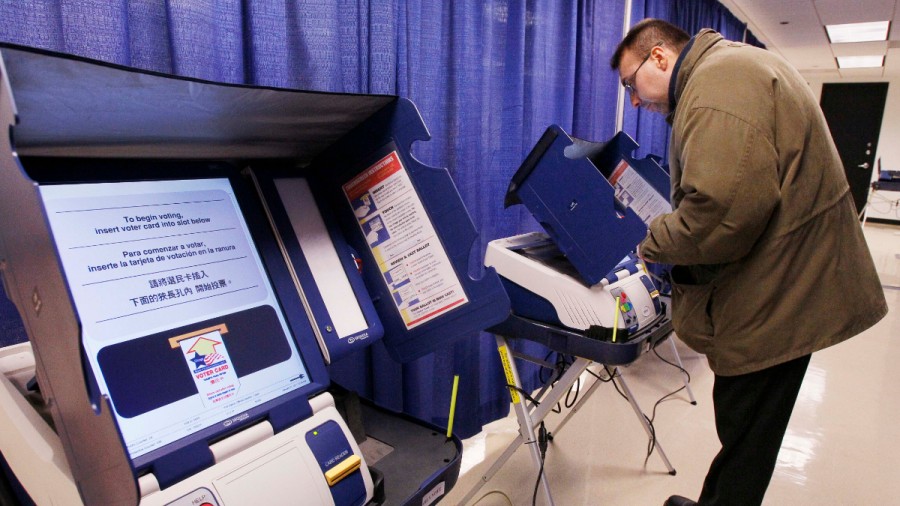‘Nightmare Scenario’: What Happens If There’s No Clear Winner In Chicago’s Mayoral Race?
By Claudia Morell

‘Nightmare Scenario’: What Happens If There’s No Clear Winner In Chicago’s Mayoral Race?
By Claudia MorellChicago election attorneys and city election officials are bracing for what they call the “nightmare scenario” on Tuesday.
No, they’re not worried about a snowstorm suppressing voter turnout. It’s about what happens if no single candidate wins 50 percent plus one of the vote on Tuesday, leading to a runoff between the top two.
More specifically, they’re worried about what could happen if no clear winners emerge from the historically crowded mayoral race, and Chicagoans are stuck with days of recounts and uncertainty about which two candidates are advancing to the April 2 runoff election.
Here’s your rundown of the possible scenarios.
When will we know the final number of votes won by the candidates?
Polls close at 7 p.m., and the results will start rolling in then. But the Chicago Board of Election Commissioners never declares winners or losers on election night. News organizations have been known to make an early call when one candidate is clearly ahead, based on available returns, or when candidates themselves will decide to concede.
“The question really ought to be, ‘Do we really think we will have a winner on election night?’ ” said elections board spokesman Jim Allen. He pointed to several polls showing the frontrunners in the mayoral race are clustered within the margin of error — statistically, it’s been a four- or five-way tie in many polls for several weeks.
So even if the No. 1 vote-getter is clear by the end of the night on Tuesday, there could be a two-or three-way battle for the No. 2 seat in the runoff.
What if there are no clear winners on election night?
Chicago elections officials will aim to release unofficial vote totals by Wednesday afternoon.
Why unofficial? Because the votes will still be coming in, Allen said.
“We are always counting votes up to two weeks after election day,” he said. Mailed-in ballots postmarked by or on Election Day could trickle in days after the polls close. Those aren’t often the make-or-break votes that decide an election. But if a race is super tight, they just might be.
Officially, those ballots must be received and counted by March 12, when the official vote count is included in the final summary, called a “proclamation report.”
The upshot: Yes, if the mayor’s race is incredibly close, it’s possible that the final results will still not be finalized for a couple of weeks after Election Day.
Can candidates ask for vote recounts if the race is really close?
Yes, but there’s a short window to do so, and it comes with a heavy legal burden. Any mayoral candidate who plans to file a complaint in Cook County Court will need to plan for that ahead of Election Day.
That’s because a candidate (or more likely their election attorney) will have to document specific cases of fraud or disenfranchisement in order to request a vote recount. If voters say they were turned away from their polling site because the doors opened late or the equipment was on the fritz, the lawyer would need affidavits of each voter who was allegedly disenfranchised. Tweets won’t cut it.
“Ninety-nine percent of the issues you encounter [on Election Day] are pure incompetence,” said Ross Secler, a Chicago elections attorney with the firm Odelson & Sterk. That’s because election judges are often temp workers who don’t get much training, Secler said.
The petition would call for a discovery recount and the rules are outlined in state law.
A candidate must be within 5 percent of the top two vote-getters to even be eligible to ask for a recount. And if a recount is granted by a judge, it would only be conducted in a random selection of a quarter of the city’s precincts, at a cost to the candidate of $10 a precinct.
Allen says new electronic voting machines have essentially eliminated discrepancies in the ballot count. That’s because each ballot has a paper receipt to back up its electronic results, so the confusion over hanging chads is relic of elections past.
Could a drawn-out legal challenge delay the April 2 runoff election?
No. But it could impact early voting ahead of that April 2 contest if the case isn’t resolved by the time the election board certifies the results. In that scenario, an ongoing legal fight that leaves results up in the air would basically mean a shorter window for early voting.
Have we ever had a crowded field like this before?
Not in the mayor’s race, but there have been some crowded aldermanic contests with even more candidates. In some wards, a crowd is the norm, not the exception.
In 2007, for example, the Southwest Side’s 15th Ward had 11 candidates on the ballot. In 2011, a whopping 18 candidates ran in the 24th Ward, located on the city’s West Side. The second place candidate, Michael Chandler, advanced to the runoff with only 13 percent of the vote. He ultimately won.
That year, the North Side’s 46th Ward had 11 candidates. Less than a tenth of a percentage-point separated the top two vote-getters.
Claudia Morell covers covers city politics for WBEZ. Follow her @claudiamorell.
